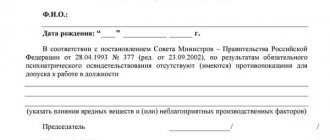An employer's groundless refusal to hire a specialist is not uncommon. Often the applicant feels less legally protected than the employer. In reality, the situation is exactly the opposite - the legislator has taken a comprehensive approach to protecting the rights and interests of applicants.
The employer must not only justify the reason for the refusal upon request, but will also be punished if his decision turns out to be unlawful. Of course, appealing the issue in court is not an easy task, but it is quite achievable.
What is an unreasonable refusal?
Russian labor law prohibits unjustified refusal to hire. Based on Art. 64 of the Labor Code of the Russian Federation, three types of unreasonable refusal can be distinguished:
1) without specifying a reason;
2) for reasons expressly prohibited by labor legislation (for example, discriminatory refusal);
3) for reasons that do not relate to the employee’s business qualities.
If the court finds that the candidate was not hired for the position due to circumstances related to his business qualities, such refusal by the employer is justified.
Legal grounds
Who may not be hired and for what job? While protecting the rights and interests of job seekers, the Labor Code provides employers with legal grounds for refusal . The main ones include:
- The candidate lacks the skills, qualifications and business qualities necessary to perform the job. Data about this can be confirmed by relevant documents: diplomas, certificates, certification results. In some cases, the employer draws conclusions about the applicant's abilities based on personal opinion - in this case, the refusal can be challenged.
- age does not comply with legal requirements. In general cases, this age is 16 years, but for work with harmful or difficult working conditions it rises to 18.
- Inconsistency of the applicant's physical or mental characteristics with the requirements associated with the job. For example, women cannot be involved in work related to lifting weights in excess of the norm established by law.
- The presence in the candidate’s work book of an entry indicating that he was dismissed with a ban on holding certain positions for a specified period of time.
- Having a criminal record or relevant medical contraindications - this applies to candidates for positions related to the education of minors, as well as for some managerial and financial positions.
Certain organizations established by law cannot admit foreign citizens or persons who do not speak Russian . For work related to toxic, narcotic or psychotropic substances, there are also some restrictions .
The state also obliges the employer to require you to have a military ID for the purposes of maintaining military records.
Who should not be refused a job?
Unreasonable refusal to hire is prohibited in the following cases:
| Rejection due to restrictions | By age, race, nationality, citizenship, religion, political preferences, language. These parameters are not related to the qualifications and work qualities of a person, therefore such a refusal is considered discriminatory and groundless |
| Women with children | Or pregnant |
| Citizens of the Russian Federation | Which do not have a place of permanent registration |
| HIV positive candidate | Due to his illness |
| Refusal to the candidate | Based on his membership or refusal to join a trade union |
| Citizen with a disability | directed to a place of work according to a quota of vacancies |
| Employment based on a court decision | Which obliges the employer to enter into an agreement with the citizen. Refusal to employ is considered unfounded |
| The man who won the competition | To occupy a vacant position or who has been selected in any way for a specific vacancy |
| Invitation to a translation position | If you arrived to take up a position within 30 days from the date of leaving your previous position |
Informal employment: legislative interpretation
Current legislation does not contain the term “informal employment”. The Labor Code of the Russian Federation provides for the only way to formalize the relationship between an employee and an employer, which implies the conclusion of an employment contract. Art. 67 of the Labor Code of the Russian Federation requires the preparation of this document in 2 copies within a period that should not exceed 3 days from the date the employee is allowed to work.
The term “informal employment” is used in business practice for all cases where an agreement between the employee and the administration was not concluded within the prescribed period. There are the following ways to apply this scheme:
- attracting an employee who is not included in the staff;
- conclusion of a civil agreement containing elements of an employment contract. More information about employment under a GPC agreement is here;
- the actual performance of a labor function by a citizen with whom an agreement has not been concluded, for a fictitious employee on staff.
Informal employment does not include cases in which taxes are not levied on part of the employees’ earnings. In these situations, employment agreements are formalized.
The most common option for informal employment is a probationary period, after which the employer will decide to hire the candidate. As a rule, this allows the employer to hire free labor for the job, since in most cases the candidate is informed of failure to complete the probationary period and is denied further employment. About legal dismissal after a probationary period at the initiative of the employer, read the article https://otdelkadrov.online/3139-osobennosti-poryadok-uvolneniya-posle-ispytatelnogo-sroka-po-initsiative-rabotodatelya.
The main reasons for justified refusal to hire
Let's consider the main reasons for a justified refusal to hire a position and their legal grounds:
- Minor children aged 16 and 14 years old - if there is no written (handwritten) permission from parents or guardians to work;
- If there is no complete package of documents when applying for a job, then the employer has the right not to accept it on the basis of Art. 65 Labor Code of the Russian Federation. The required package of documents includes:
- Citizen's passport;
- SNILS
- Education document;
- Certificate of no criminal record;
- Military ID;
- Employment history.
- The employer has the right to refuse women - if there are special or difficult working conditions at the workplace, including the need to carry heavy loads in excess of the permissible norm
- A minor can receive a reasoned refusal if he wants to apply for a job with difficult conditions that can harm the body and health in general.
- The employer has the right to refuse employees who have previously received disqualification from their position, as evidenced by an entry in the work book.
- If the applicant for the position was punished in the form of restrictions on specific jobs;
- A justified refusal can be received by persons who are not allowed to work for specific positions due to mental disorders and diseases (patients with epilepsy, drug addicts and those suffering from alcohol addiction).
When refusal of employment is permitted
There are cases when the need to establish restrictions when hiring is provided for by law and appealing such decisions is unacceptable.
For example, persons under the age of 18 are not allowed to perform work:
- providing for full financial liability for them;
- with harmful and (or) dangerous working conditions;
- underground;
- that can cause harm to their health and moral development;
- involving the transfer (movement) of heavy loads in excess of the established maximum norms;
- carried out on a rotational basis.
It is also not allowed to sign an employment contract with a candidate who has received a negative conclusion based on the results of a preliminary medical examination, if its necessity is provided for by law. The most common positions for which employment is possible only after passing a medical examination are driver, salesperson, and catering worker.
Liability for unjustified refusal to hire
Unlawful refusal of employment may result in administrative, disciplinary and criminal liability.
Disciplinary responsibility
Measures taken in the form of a reprimand, reprimand, up to and including dismissal from their position are taken against officials of the organization in respect of whom guilt has been recognized and who have been subject to disciplinary sanctions.
Administrative responsibility
If the norms of legislation on employment and labor protection are violated, fines are determined in the following amount:
| For an official | 5 thousand rubles |
| To the enterprise | From 30 to 50 thousand rubles |
| Suspension of activities | For a period of up to 90 days |
Important!!! If an official repeatedly violates employment legislation, then a measure in the form of disqualification for a period of up to 3 years is applied to him.
Criminal liability
If a refusal was made to admit a pregnant woman or a worker with children under three years of age, then such an action may be subject to criminal liability. An employee is brought in to deal with her, who decided to refuse to apply for her job.
A recognized crime obliges the guilty official to pay a fine of up to 200 thousand rubles, or the amount of wages for 18 months as compensation to the woman, or he may be assigned compulsory correctional labor for up to 180 hours.
Two types of responsibility
Individuals and legal entities, using the labor of hired employees, are differently responsible for their registration before the state.
It often happens that individual entrepreneurs ignore employment contracts, which does not relieve them of responsibility if this fact is established, especially against the backdrop of tightened control. Legal entities more often commit violations and delays in registration. Both of them face very serious, albeit different, penalties for such violations.
Let's consider the forms of liability depending on the type of employer.
What threatens the “thrifty” individual entrepreneur
If a private entrepreneur does not do all the work himself, but hires other people, he must comply with the requirements of the Labor Code of the Russian Federation. It is quite understandable to want to save on taxes and deductions; you don’t want to waste time and effort on official registration. However, if illegal employees are identified, the individual entrepreneur may receive such troubles and financial losses that no savings on payments can compare with them.
If an employee has worked for hire for 3 or more days, and no contract has been concluded with him, this will delay the start date of tax collection and the counting of the length of service, which means damage will occur. The later the employee is registered, the higher the damage. Depending on the time of delay and the number of such employees, liability may be administrative or criminal.
The administrative responsibility of an individual entrepreneur includes:
- imposition of a fine in the amount of 1-5 thousand rubles. for each employee;
- forced suspension of the organization’s work for up to 90 days.
Significant violation of registration deadlines and the absence of employment contracts for a large number of workers indicate that the amount of taxes and deductions not received by the state is very significant. Such a violation requires more serious liability, especially if the perpetrator is unable to pay damages. When the violation is not under an administrative, but under a criminal article, the amount of fines and types of sanctions are different.
Individual entrepreneurs face criminal liability :
- a fine in the amount of 100-300 thousand rubles;
- imprisonment (real, not suspended) for up to 2 years;
- After serving time in prison, the entrepreneur will never again be able to engage in business in the area where he committed this offense.
FOR YOUR INFORMATION! Any type of liability obliges the violator to first compensate the treasury for losses caused in the form of unpaid taxes and fees, and then be punished by a fine.
What to do in case of an unreasonable refusal?
Part 6 of Article 64 of the Labor Code of the Russian Federation establishes the provision that an employer’s unlawful refusal to conclude an employment contract with an applicant can be appealed in court. That is, for example, appealing to the State Labor Inspectorate (state labor inspectorate) to resolve this issue is pointless - this is not within its competence. Such cases are subject to consideration in the prescribed manner by district courts. In this case, the period for applying to the court is three months from the moment when the person looking for work learned about the illegality of the refusal to sign an employment contract with him.
In the statement of claim, the applicant needs to structuredly and consistently set out all the circumstances of the failed employment and, most importantly, make a demand to recognize the refusal to hire as illegal.
Do not forget in the statement of claim to ask the court to oblige the defendant:
- compensate for the losses incurred by the plaintiff (this may include the payment of state duty and lost earnings that the applicant could have received if he had not encountered discrimination when hiring);
- compensate the candidate for moral damages;
- as a result, still conclude an employment contract.
If you believe that you were denied a job illegally, you must obtain a written refusal from the employer.
And only with this document go to court. Since the absence of such a document, or at least confirmation of the fact that a citizen has contacted a given employer regarding employment, will put the plaintiff in a very difficult position during the trial. This will make his position more unstable and reduce the chances of winning the case. Rate the quality of the article. Your opinion is important to us:
How to appeal before trial
Pre-trial appeal includes 2 stages:
- Complaint to employer.
- Complaint to the Labor Inspectorate.
Claim
Before appealing, an unsuccessful employee has the right to request justification for the reason for non-hiring in writing; it must be provided within 7 days. If the manager neglects to respond, going to court to appeal is still permitted. The court will force a decision from him.
If justification is provided and the reason appears to the applicant to be unlawful, a claim is sent with a requirement to correct the violation voluntarily. A warning is also indicated here that you intend to appeal the received response to Rostrud and the court to protect your rights.
Complaint
If the reason is unlawful or the employer did not hire those persons who cannot be refused employment, appeal the refusal to Rostrud through the website onlineinspection.rf. Illegal refusals to hire for a position fall into the “Dismissal” category.
The text of the appeal is drawn up in free form. It is recommended to specify:
- Employer details.
- The circumstances, the reason he gave.
- Justification for disagreement with the decision made.
- Requirement to organize an inspection.
Attach evidence of the employment attempt, if any, to the appeal (a screenshot of the vacancy, a copy or photo of the employment application, a copy of the decision), or indicate that the employer refused to issue the document.
Fine for an unregistered employee in 2019 - responsibility for individual entrepreneurs and LLCs
- Removal of officials from work;
- Imposition of large fines on legal entities. person in the amount of up to 100,000 rubles;
- Imposition of fines on the head of an organization in the amount of up to 5,000 rubles;
- Suspension of activities for a period of 90 days;
- Criminal prosecution;
- Correctional work;
- Arrest for up to three years.
- If the foreigner does not have permission for any type of activity;
- If a special permit has not been issued to attract a foreigner to work;
- If a contract has been concluded with a migrant under which he was not notified of the terms of work;
- When a foreign citizen works in a profession other than that specified in his work permit.
Fine for an unregistered employee
To establish and suppress violations in labor legislation, there are regulatory authorities. There are quite a few of them, but the most common “headache” directly related to employee rights is tax and labor inspections. The legislative system of inspections is based on Federal Law No. 294, and the tax office inspects enterprises in accordance with Chapter 14 of the Tax Code of the Russian Federation. Both of them can catch “illegals”.
- What threatens an entrepreneur who decides not to pay due taxes and deductions for his employees?
- What will be the liability of a legal entity whose company’s employees signed an employment contract much later than they began their activities?
- How can this violation be detected and on what basis is punishment imposed?










